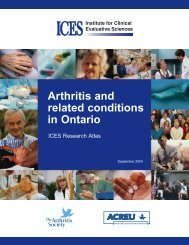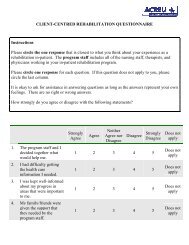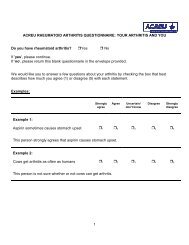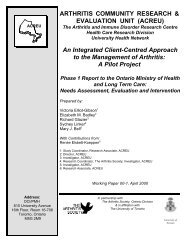Client-Centred Rehabilitation - Arthritis Community Research ...
Client-Centred Rehabilitation - Arthritis Community Research ...
Client-Centred Rehabilitation - Arthritis Community Research ...
Create successful ePaper yourself
Turn your PDF publications into a flip-book with our unique Google optimized e-Paper software.
4<br />
Executive Summary<br />
Objectives<br />
♦ To further develop the concept of<br />
client-centred care in the Draft<br />
Policy Framework and Service<br />
Delivery Model as it applies to<br />
rehabilitation.<br />
♦ To identify client-centred parameters<br />
for rehabilitation programs.<br />
♦ To identify criteria for evaluating the<br />
extent to which various rehabilitation<br />
programs are client-centred.<br />
Methodology<br />
♦ Review of the literature<br />
♦ Focus groups with adult clients with<br />
chronic disabling conditions<br />
Results<br />
We did not find a universal definition for<br />
client-centred care, rather, a variety of terms<br />
such as client-centred practice, patient<br />
focused care and patient centred care is<br />
used. Two main categories of literature were<br />
identified: individual client /practitioner<br />
level literature and system level literature.<br />
At the individual client/practioner level the<br />
majority of the work was profession specific<br />
such as occupational therapy, medicine and<br />
nursing. Occupational therapy literature on<br />
client-centred practice was the most<br />
extensive and relevant to client-centred<br />
rehabilitation. However, it tended not to<br />
include broader system level issues. Other<br />
than the occupational therapy literature that<br />
focuses on individual therapist and client,<br />
little work has been done specifically in<br />
rehabilitation. As well, the professionspecific<br />
literatures define client-centred care<br />
from the professional’s perspective, not the<br />
client’s.<br />
At the system level, much of the work to<br />
date is acute care, hospital focused that<br />
emphasizes patient focused care that refers<br />
to the redesign of patient care so that<br />
personnel and resources are organized<br />
around the patient instead of departments.<br />
The notable exception is the work of the<br />
Picker Institute that has identified<br />
components of patient centred care at both<br />
the individual and system levels from the<br />
client’s perspective. However, their work<br />
tends to be acute care focused.<br />
In order to address the limitations in the<br />
literature with respect to identifying<br />
components of client-centred rehabilitation<br />
from the client’s perspective we conducted<br />
focus groups with adults with chronic<br />
disabling conditions such as arthritis, total<br />
joint replacement, acquired brain injury,<br />
respiratory conditions, spinal cord injury,<br />
and multiple sclerosis. These client groups<br />
were chosen based on the target groups from<br />
the <strong>Rehabilitation</strong> Reform Pilot Projects.<br />
The main themes that emerged from the<br />
focus groups were: individualization;<br />
participation in goal setting and decisionmaking,<br />
lack of preparation for life in the<br />
real world, the need for emotional support,<br />
and systems issues. The major theme<br />
underlying both the individual and system<br />
level issues was the issue of transition from<br />
rehabilitation programs to the community.<br />
Participants felt ill-prepared for community<br />
living and, once discharged, felt isolated and<br />
had difficulty finding out about and<br />
accessing community services.<br />
Furthermore, all participants talked about<br />
the need for ongoing access to rehabilitation<br />
and services once they have returned to the








